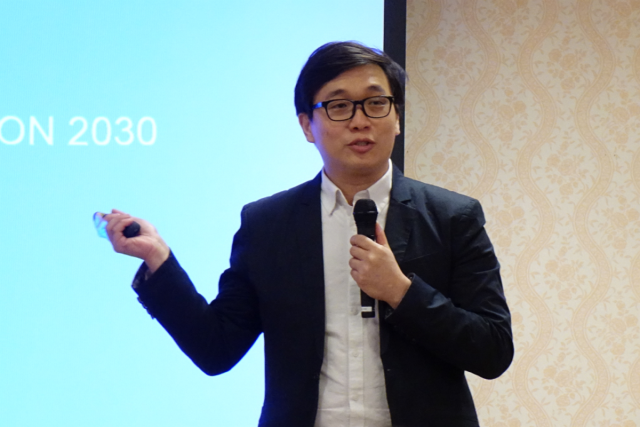Blockchains are immutable..that’s a fact….however, for blockchains to become interactive, emerging technologies MUST have a role to play. Oracles, UX and artificial intelligence (AI) create immersive experiences which extend their use-cases.
These use-cases provide entry into all kinds of industries and paves the way for higher adoption rates.
Rather than go through the process of deploying non-interactive blockchains, AI gives user flexibility on a scale never seen before.
The use of Oracles will come into play as “smart” blockchains take canter stage over code-driven blocks that require several human interventions.
Our panel of experts extend crypto and blockchain projects in many ways and with extra scenarios….here’s what they had to say…
“AI will be a great tool to seed and germinate new perspectives we haven’t thought of when advancing crypto and blockchain technologies. The abilities of tools like ChatGPT to rapidly develop and prototype new functionality from human language, which returns code, for example, or gives a unique perspective on a particular approach to solving a problem, help us build new perspectives and increase the adoption of these technologies. Only time will tell whether that technology is used to improve current processes within technology companies or to produce an entirely new product that stands on its own.
I want to see how AI can produce further interoperability between non-crypto-based systems and blockchain technologies. I am a massive fan of automation due to my background in cloud infrastructure. What excites me the most is seeing how AI will help automate and connect the way traditional financial technologies, crypto, blockchains, and other forms of digital assets work. Eventually, AI will build a conduit between traditional finance and crypto, moving financial data seamlessly between both these worlds and producing insights and information that we, as humans, may have never even noticed.Whatever the case, the models used to train these AI systems will only improve as the accessibility of these technologies continues becoming more publicly accessible. The more integrated it becomes into our current technology, the more it will understand our behaviors as humans. It will provide scenarios and opportunities to help improve financial situations worldwide by speeding up crypto and digital asset adoption.”
Viktor Lindell, Strategic Web3 Advisor at MetaversePlus
“AI will likely play a huge role in making the blockchain more secure, scalable and easy to use. It will become increasingly important as it will facilitate the creation of smart contracts, monitoring transactions and suggesting improvements.
With the help of AI, transactions (which are public in blockchains) can be monitored to detect fraud and suspicious behavior continuously and instantly, which makes users and interactions safer. AI will also be able to identify bottlenecks and improvement areas to make systems and protocols more robust and efficient.Smart contracts can use AI to make increasingly sophisticated decisions, based on various patterns and changing conditions to self-execute and fulfil predetermined goals. The use cases will grow exponentially.
As AI becomes more prevalent and adept at the creation and expansion of content, it can also build whole blockchain-based immersive worlds, based entirely on set rules and the input of the user.”
Georges Tertois, Co-Founder & General Manager, Eidgensi
“AI is more than just a buzzword; everyone should ready themselves for it to turn their industry on its head. The speed at which AI tools can generate copy and graphics is seriously impressive. For many of our customers in the advertising industry, we can see it supercharging the content creation process, allowing them to focus on creating impactful campaigns, while making efficiency savings and reallocating budgets to better reach audiences.
“Crypto also stands to be supercharged by the AI revolution. Crypto trading bots are already a great example of how AI can help crypto-traders to better analyse the market and maximise profits. But with a tool this powerful, the possibilities are truly endless. AI-driven fraud protections could help stamp out bad actors, or it could be used to power a decentralised autonomous agent –essentially an automated investor that would look after your crypto portfolio.”
Jules Dudko, Founder and CEO at FrequenC
“Combining AI with Web3 technologies can unlock new revenue streams for creators. Web3 will enable artists to register their work as NFTs (or perhaps another transaction that will offer royalties via a transaction) so that no one can use them for commercial purposes without compensation. For example, this solution could be applied to voice narrators worried about AI-generated readers being trained using their voices and, as a result, putting them out of business.
In the ideal Web3 world, a narrator could register their voice recording as an NFT, and an AI audiobook narration studio could record the repurposed voices as derivatives of the artist’s original NFT, delivering royalties to the contributing creator with each sale. Using AI together with Web3 technologies would make it much harder for data thieves to steal work, and any attempt to do so would result in legal consequences for violating the creator’s rights to the registered asset.”
Related: Finance with Artificial Intelligence
Shubham Munde, Research Analyst, Market Research Future
” Artificial intelligence (AI) has the potential to significantly impact the development of cryptocurrency projects in several ways. Some of the ways AI could affect cryptocurrency projects are as follows:Trading and investment decisions: AI can be used to analyze large amounts of data and make predictions about future cryptocurrency prices. This can be particularly helpful for traders and investors looking to make informed decisions about buying and selling cryptocurrencies.Fraud detection: Cryptocurrencies are susceptible to fraud and hacking, and AI can be used to detect and prevent fraudulent activities. Fraud can take many forms in the cryptocurrency space, including phishing scams, hacking attacks, Ponzi schemes, and more. AI can be used to detect and prevent fraudulent activities in several ways:• Anomaly detection: AI can be trained to detect unusual patterns in cryptocurrency transactions that may be indicative of fraud. For example, if a large number of transactions are being made to an unfamiliar address or if a single account is making a large number of transactions in a short period of time, it could indicate fraudulent activity. • Predictive analytics: AI can analyze historical transaction data and make predictions about future fraud attempts.This can help to identify potential fraudsters before they can execute their schemes. • NLP: AI can analyze social media and other online sources to detect patterns of fraudulent behavior. For example, if there are a large number of social media posts promoting a particular cryptocurrency, it could be a sign of a scam. • Network analysis: AI can be used to analyze the connections between different cryptocurrency wallets to detect fraudulent activities. For example, if a large number of transactions are being made between a small number of wallets, it could indicate a scam or money laundering scheme.
Blockchain analytics: AI can be used to analyze blockchain data, including transaction history and network activity, to identify patterns and insights. This can help developers to improve the performance and scalability of blockchain networks. Smart contracts: AI can be used to automate the execution of smart contracts, which are self-executing contracts with the terms of the agreement between buyer and seller being directly written into lines of code. This could lead to more efficient and accurate contract execution, reducing the need for human intervention. User authentication: AI can be used for user authentication, which can help to increase the security of cryptocurrency transactions and prevent unauthorized access to user accounts. “
About MRFR: MRFR has specialized research analysts in Aerospace & Defence, Automotive, C&M, Energy & Power, F&B, Healthcare & Pharmaceutical, ICT, Industrial Equipment, Packaging, Construction & Mining, and semiconductors. Our specialists are experts in their fields and are well-versed in their respective sectors. www.marketresearchfuture.com.
Cuautemoc Weber, Co-Founder and CEO of Gateway.fm
“AI is presenting unique opportunities to expand the parameters of creativity and innovation across the industry spectrum, including the crypto and blockchain space. The momentum within the global AI ecosystem shows no signs of slowing down, with stunning levels of investment capturing the scale of interest in the space in recent years. Between 2015 and 2021, global AI investment skyrocketed from $12.75 million to $93.5 billion, and is predicted to reach $422.37 billion by 2028. By that point, we can expect the Web3 era to be in full swing, with innovative deployments of AI helping to mitigate the risk of fraud, analyze transaction data, identify platform security vulnerabilities, automate processes and provide valuable insights into market trends and user behaviour. From a creativity point of view, we’ve already seen how Generative AI is redefining the role of an artist in today’s society, dramatically reducing the manual burden on content creators, negating the need for extensive and intricate design skills. Generative AI can also serve as a prominent driver of artistic expression in the Web3 arena moving forward.”
Cameron B. Pick, Partner at Marshall Gerstein & Borun LLP in Chicago
“I could see AI and crypto having an interesting synergy. For example, a driverless car may be able to pull into a gas station, automatically fill up, and pay for the gas by sending crypto to the gas station owner. Or the driverless car could send the crypto to a smart contract which forwards it to the gas station owner upon determining that the gas tank is full. Crypto can also be used with AI as other IoT devices negotiate with each other. For example, AI in an IoT device may identify peak times to receive power from a smart grid and can transfer cryptocurrency to an energy provider in exchange for receiving energy during those peak times.”
Related: We Are Beginning The Age Of AI
Camellia Chan, CEO of X-PHY, a Flexxon brand,
“The past year was tough for crypto markets thanks to events like the Terra Luna meltdown, the FTX bankruptcy, and more. The industry also incurred losses of almost $4 billion in 2022 due to various hacking, fraud, and scam-related incidents. Some of the major cybersecurity risks associated with cryptocurrency include phishing and malware, among others. Phishing is a type of cryptocurrency scam that involves tricking victims into giving up their private keys or personal information. The attacker typically disguises themselves as a legitimate entity or person to gain a victim’s trust. Once scammed, the attacker then uses the victim’s details to steal their cryptocurrency funds. Crypto-related malware leverages a victim’s device to continuously and inconspicuously mine for cryptocurrency. An inconspicuous threat, this type of malware masquerades as legitimate software that, once downloaded, embeds malicious code into various applications and programs. The code then runs in the background and mines for currency when a victim is using their device.
As crypto related cyberattacks continue to grow in volume and complexity, security professionals are feverishly building security solutions to help combat them. And as this niche within the security market advances, we will come to find that the strongest players will be AI-powered solutions. Why? As AI consumes data artifacts it becomes smarter, enabling it to analyze relationships between threats in seconds (whereas it could take a human days, if not weeks). As a result, AI reduces time to knowledge, empowering faster decision making and remediation of threats.That said, as the crypto market is still in its infancy, so are the technologies being built to protect it. In the meantime, individuals and organizations need ways to protect themselves and their investments now. That’s where AI-driven security solutions at the firmware level comes in. This is the ultimate security measure for protection, as it sits as close as possible to a user’s data – protecting against threats like phishing scams, malware, and much more, in real-time, becoming smarter with every threat, and each stroke of a key. Security at the firmware level acts as a final line of defense in this ever evolving and extremely uncertain crypto threat landscape.”
Donald Patterson, Professor of Computer Science at Westmont and UC Irvine and CTO at Blockpliance
There are several ways in which artificial intelligence is poised to impact the development of cryptocurrency and blockchain projects. From a software development perspective, emerging AI tools such as ChatGPT are expected to accelerate the process of software engineering, thereby shortening the time from concept to market. While this technology is still nascent, it is rapidly changing and is expected to reduce the time to market considerably in the near future. It also isn’t specific to cryptocurrency but software engineering in general.
On the analytics side, AI has the potential to leverage the vast amounts of visible data in public blockchains to enable predictions about market trends and analyze the source of funds to ensure compliance with anti-money laundering regulations. This is the basis of my start-up blockpliance.com. This can help to stabilize the market economically and socially by providing insights into market behavior and trends that were previously impossible to obtain. Not only are economic trends interesting in the way stock market data is valuable, but the real-time trends might also be helpful for detecting security, fraud and market manipulation.
AI can also play a critical role in managing energy and computational needs in data centers, particularly as it relates to cryptocurrency mining. This includes the ability to relocate computational resources to regions where power is cheaper during periods of low peak usage, such as at night or other off-peak hours, even on an hourly basis. This optimization of energy and computational resources can help to reduce costs and improve the efficiency of mining operations.
Justin Giudici, Co-Founder Telos
Artificial intelligence is already having a significant impact on the development of cryptocurrency projects, at Telos we are already using it to write more secure code, design and run unit tests, decide winners of contests, produce graphics, write tweets and other marketing materials. AI is already improving our production and efficiency. Technology like AI could well enable lowly funded projects like ours to compete head to head with larger players like Solana and Polygon.
Anndy Lian, Inter-Governmental Blockchain Advisor
Cryptocurrencies are often associated with fraud and scams. AI could be used to develop more effective fraud detection systems that can identify fraudulent transactions or other suspicious activities more quickly and accurately.
AI can be used to develop more advanced trading algorithms that can analyze market data and make more accurate predictions about cryptocurrency prices. This could potentially lead to more profitable trading strategies and more efficient markets.Lastly, in my keynote speech at TMRW Conference in Dubai. I have mentioned about Web4, a more decentralised web that is driven partly by AI. The inclusion of Ai could potentially improve the transparency and security of the cryptocurrency ecosystem.



















